

Foreword
Where last year’s Research Conference demonstrated BNU’s commitment to building our research culture and showcasing the amazing research taking place at Buckinghamshire New University, this year’s 2025 event highlighted both this and a core BNU value – our consistent and unwavering support for innovative research. In opening this year’s event I highlighted the importance of research not only in its capacity to explore new ideas and to create new understandings, but also to challenge existing practices and reexamine existing ways of thinking.
The Conference Proceedings in this issue will, I hope, show just how committed our researchers are to looking not only to the future but also to how research reimagines, reinterprets and rethinks the things that matter to us. One look at the proceedings, for example, establishes just how great the potential impact of artificial intelligence (AI) will be – with presentations on its impact on areas ranging from programming to security and from life simulation to stop-motion animation. As with last year’s event these proceedings are accompanied in this issue by photos taken by student photographers from BNU’s College of Creative Arts, Technology and Engineering, and should help give a flavour of the day for those who weren’t able to join us for the event.
In this issue we’re also able to showcase ongoing research on how clinical practitioners transition into academic roles, and how BNU researchers are creating software tools to enable care providers to face everyday challenges. As part of our regular publications section, we’re also proud to include a spotlight on a new monograph by Associate Professor Liana Psarologaki alongside details of the work by BNU researchers in previous months.
It's said that universities prosper through the sharing of knowledge, the challenging of assumptions and the reimagining of ideas – and on the evidence of this year’s Conference I’m confident that BNU’s commitment to supporting innovative and inclusive research is as strong as ever.
Professor Jermaine Ravalier Pro Vice-Chancellor (Academic)

Introducing BNU’s new Associate Deans for Research
BNU has recently appointed three Associate Deans for Research as part of an ongoing commitment to the growth of the university's research culture.
In this section Professor Sabuj Mallik and Professor Adetoro Adeyemi Adegoke talk about what research means to them and their plans for fostering future research at BNU.
PROFESSOR SABUJ MALLIK
ASSOCIATE DEAN FOR RESEARCH AND KNOWLEDGE EXCHANGE
College of Creative Arts, Technology and Engineering (CATE)

My academic journey has always been shaped by a passion for innovation, collaboration, and impactdriven research. With a background in engineering, project management, and applied industry-focused initiatives, I have been privileged to work across disciplines that bridge theory and practice, with my primary research interest and speciality being in multidisciplinary areas of electronics interconnection materials, manufacturing, and reliability engineering. I'm also actively engaged in research related to thermal management using advanced metal matrix composites and reliability engineering – an area that includes experimental studies involving thermal cycling, highly accelerated life testing, and failure analysis, as well as fatigue modelling of solder joints using finite element methods.
Much of my research to date has explored how higher education and industry can collaborate effectively, particularly through knowledge transfer, to solve real-world challenges. My vision for research within the College of Creative Arts, Technology and Engineering is to build on BNU’s existing strengths while forging new pathways that bring together creativity, technology, and applied engineering. I am keen to support colleagues to develop research that has both academic rigour and tangible societal and industrial impact. This means championing interdisciplinary projects that connect the arts with technology, engineering with sustainability, and creative practice with emerging digital tools.

I see a particular opportunity in strengthening knowledge exchange and external partnerships, ensuring our research remains relevant and responsive to the needs of industry, communities, and policy. I want to help cultivate a culture of research that is inclusive and ambitious, where colleagues at every career stage feel supported to develop their ideas and contribute to collective success.
Looking ahead, I believe research at BNU should be defined by three principles: collaboration, inclusivity, and impact. For me collaboration means breaking down barriers between disciplines and working with external partners to co-create solutions, while inclusivity means ensuring that our research community is diverse, supportive, and accessible to all, including voices that are often underrepresented
in academia and industry. Impact means ensuring that the work we do makes a real difference – to our students, our region, and wider society.
The new College provides us with a unique opportunity to rethink how research is shaped, supported, and shared. My ambition is that our research will not only advance knowledge but also inspire innovation, foster creativity, and drive positive change across sectors. I am excited to work with colleagues to build a vibrant research culture that reflects the ambition and distinctiveness of Buckinghamshire New University.
PROFESSOR ADETORO ADEYEMI ADEGOKE
ASSOCIATE DEAN FOR RESEARCH AND KNOWLEDGE EXCHANGE
College of Health and Society

My career has been shaped by a passion for tackling health inequalities and ensuring that research translates into meaningful social change. As Professor of Health Inequalities, my work spans across Africa, Asia, and Europe, with a particular focus on women’s health, midwifery, health workforce development, and inclusive models of care. I have been privileged to lead projects in partnership with international organisations, NHS Integrated Care Systems, and local communities, where co-production and equity sit at the heart of everything we do.
Within our College, I see enormous potential to build on existing strengths while creating new opportunities for staff and students to engage in impactful research. My immediate priorities include supporting colleagues to increase high-quality research outputs that reflect our applied, practicebased strengths and the building of a stronger pipeline of external research and KE funding, particularly with NIHR, Research Councils, NHS partners, and civic organisations. I see as central to this the developing of impact case studies that showcase the difference our work makes in health, social care, education, and community wellbeing, and establishing more opportunities for early-career researchers and doctoral students to thrive within an inclusive and supportive research culture. Lastly, I will be working with colleagues in strengthening knowledge exchange activities so that our work is not only published but also shared with policymakers, practitioners, and communities in ways that inform practice and improve lives.
With the future in mind I agree wholeheartedly with Sabuj’s assessment of BNU’s priorities. I believe our research future rests on prioritising inclusion, impact, and collaboration. Inclusion has to be embedded into the DNA of our research – ensuring that diverse voices, especially those from marginalised communities, are central to our work. BNU has to focus on impact by producing research that is not only rigorous but that also demonstrably changes policy, shapes practice, and benefits society. Finally, we must expand collaboration across disciplines, across borders, and across the communities we serve – it’s my firm belief that BNU can be positioned as a hub for transdisciplinary and civic-minded research.
My vision is for BNU to be recognised nationally and internationally as a university that punches above its weight in research and KE, that is distinctive for our focus on equity, that is known for our community-engaged approaches, and that is respected for the way we connect local relevance with global significance. I look forward to working with colleagues across the College and the wider University to realise this vision together.
Inaugural Lectures at BNU
BNU’s Research and Knowledge Exchange Office is excited to announce our Inaugural Lecture Series, consisting of a series of lecture events running through to Summer 2026. These celebratory events enable the University to come together in giving conferment to academics who have achieved the accolade of Professorship and Associate Professorship.
The lecture series commenced in October 2025 when Professor Sarah Williams delivered their lecture on The Performance and the Person: Women’s Experiences in PR work . Sarah’s research work explores the complex identity work embedded in public relations roles, examining the dual aspects of performance that define the profession – as Sarah puts it:
On one level, PR practitioners engage in visible, literal performances-media relations, events, presentations, and public appearances. On a deeper level, however, they navigate the subtle, ongoing performance of professional identity. This research draws on Goffman's dramaturgical lens to explore how individuals present themselves within organisational and societal expectations.
Lectures in the series are open to all, and for more information please visit our Inaugural Lecture Se ries web page.
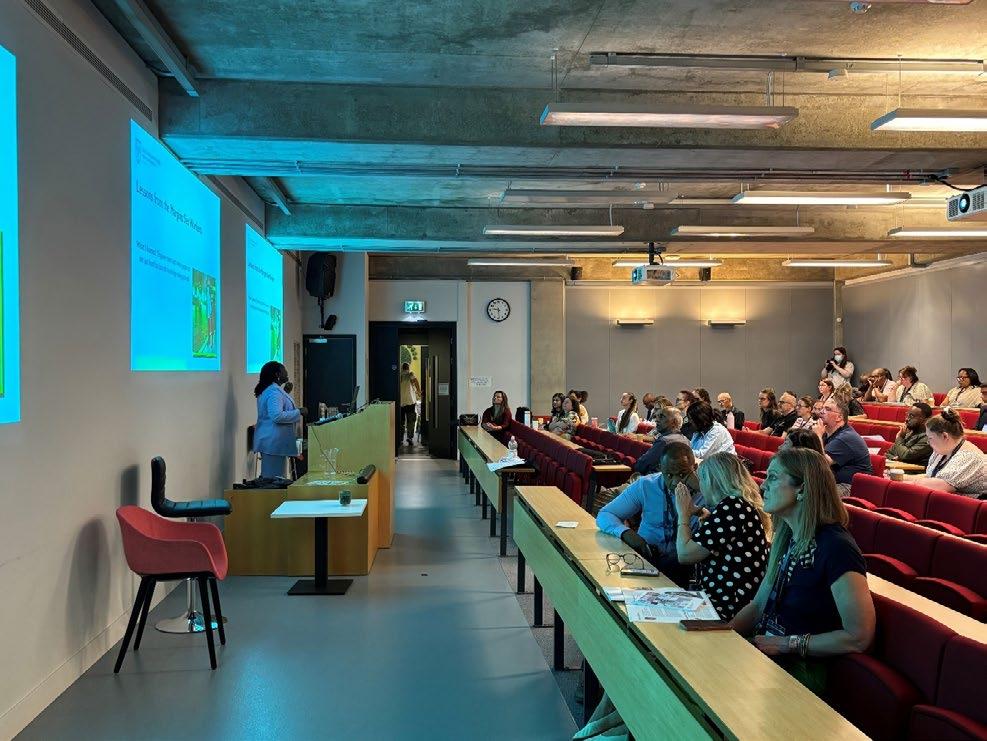
Practice Clinicians Becoming Academic
Authors and Collaborators:
KATYON WARRICK SENIOR LECTURER
College of Health and Society
DR ELISAVET KALPAXI LECTURER
College of Creative Arts, Technology and Engineering
MAGDALENA MOSTEANU LECTURER
College of Creative Arts, Technology and Engineering
This project explores how clinical practitioners transition into academic roles, and sheds light on the unique challenges faced by new lecturers as they integrate practical experience with academic research. Practice Clinicians Becoming Academic aims to uncover effective and engaging ways to communicate these insights, and by delving into institutional support, mentorship, professional development, and community engagement, we foster a deeper understanding of how clinicians can thrive in academia. This space serves as both a resource and a conversation, helping clinicians bridge the gap between theory and practice while also equipping them with the competencies, strategies, and support mechanisms needed for a successful academic transition.
This study employs verbatim theatre methods to transform interview material gathered from clinicians transitioning into academic roles into performative scripts.
FIONA CHALK
CONTINUING PROFESSIONAL DEVELOPMENT LEAD
College of Health and Society
KHONG HERN LOW
SENIOR LECTURER
College of Health and Society
ANNA AGYARE
LECTURER
University of Bedfordshire
Using participants’ exact words, the process involved careful selection, editing, and sequencing to construct a dramaturgical narrative that maintains the authenticity of the original speech while drawing out key themes and emotional resonances. Actors are then directed to embody these voices through detailed vocal and physical work, including techniques such as psychological gesture. This embodied approach enables performers to capture not only the content but also the nuance and affective weight of the lived experiences represented. The methodology reflects a commitment to interdisciplinary practice, using theatrical tools to animate research findings and enable deeper emotional and intellectual engagement with the data.
By sharing personal experiences, strategies, and challenges faced during this transition, the Practice Clinicians Becoming Academic blog intends to inspire and support other clinicians in their journey toward academic involvement, thereby enriching both the clinical and academic communities.

Connected Care: Creating a Software Tool for Goal and Resource Analysis
DR SAFA THARIB SENIOR LECTURER
College of Creative Arts, Technology and Engineering
Buckinghamshire New University is working with digital agency Pocketworks on Connected Care , a collaborative research project exploring how mobile technology can make care services more efficient, transparent, and responsive.
The project’s aim is to address some of the everyday challenges faced by care providers, such as fragmented communication, scheduling issues, and limited visibility for families. By developing a digital care management tool, the team hopes to create a more connected and reliable way of delivering care, ultimately improving the quality of life for care recipients while supporting the work of carers. At its current stage, the project’s focus has been on understanding user needs and translating these into an interactive, clickable wireframe prototype. Early designs illustrate how the final system might look and operate, providing a practical foundation for further development, and the prototype acts as a communication tool between researchers, care professionals, and technical partners, ensuring that design decisions remain grounded in the realities of the sector.
The next step will see the prototype tested in BNU’s state - of- the - art simulation labs, as these facilities allow for realistic care scenarios to be recreated, providing valuable opportunities to test usability, gather feedback, and refine the design before moving to a fully functional version. The potential outcomes of Connected Care are wide - reaching; if successfully developed and adopted, the system could help care providers streamline operations, reduce missed or delayed visits, improve communication with families, and enable better decision - making through access to real - time data. While the project is still in its early stages, it demonstrates how research - led collaboration between universities and industry can create practical digital solutions with the potential for meaningful social impact.

Conference Proceedings
In building on the success of the 2024 Research and Enterprise Conference the BNU Research Conference 2025 represented a celebration of BNU’s talented researchers and the innovative and inclusive research being fostered by BNU. To properly showcase this the Conference took the empowerment of inclusive research as its theme, and building on feedback from last year’s attendees the event both increased the number of presentations and provided a dedicated space for a research student colloquium event as part of the afternoon sessions.
Pro Vice-Chancellor Professor Jermaine Ravalier opened the day’s proceedings by welcoming the attendees and reminding them that the day would be filled with presentations that would evoke, provoke and galvanise both thoughts and reactions from all attending. This year’s opening keynote, delivered by Professor Adetoro Adeyemi Adegoke, centred on empowering research through the civic mission of inclusive knowledge, and outlined BNU’s mission to be a civically engaged, inclusive institution whose research is rooted in the local community.
These Conference Proceedings highlight the sense of continuity that this second Conference event helps to encourage, and the proceedings covered in the following pages will give all those who weren’t able to join us on the day the details of the presentations made by a panoply of BNU’s academic staff and postgraduate research students accompanied by photographs from the event taken
by student photographers from BNU’s College of Creative Arts, Technology and Engineering. The poster for the event was also chosen from a selection of entries from students from the College of Creative Arts, Technology and Engineering. This event was closed by Professor Florin Ioras, who will in coming months be commencing in their new role as Emeritus Professor at BNU.
120 Attendees 28 Presentations 26 Research Posters exhibited 26 Research on a Postcard entries
An investigation into the extent AI will have on Stop-motion animation production
DR JOHNNY ISSAPOUR LECTURER
College of Creative Arts, Technology and Engineering
Stop-motion is a distinct animation technique where objects are carefully adjusted in small increments between each photographed frame, creating the illusion of independent movement when the sequence is played back. Unlike other forms of animation, stop-motion relies on intricate armatures and engineering to make puppets move as realistically as possible.
In recent years, artificial intelligence has been incorporated into 2D and CGI animation processes, transforming the way animations are produced. While AI has helped speed up production and made animation more affordable, especially in 2D and 3D styles, it can be argued that the realism of the performances may not always be as natural or lifelike as desired.
This presentation explored how AI is influencing the stop-motion animation production process by examining current practices and methods in the field.
This research investigates the potential impact AI may have on stop-motion, a subject that draws on knowledge from various disciplines, including animation, performance, engineering, psychology, sociology, and biomechanics.
The study conducted as part of this research involves a comprehensive questionnaire and interviews with professionals across the industry. Through these findings, the research will provide valuable insights into how AI will shape the future of stop-motion production, animated storytelling, and its impact on production process, time scale, skills and employment.
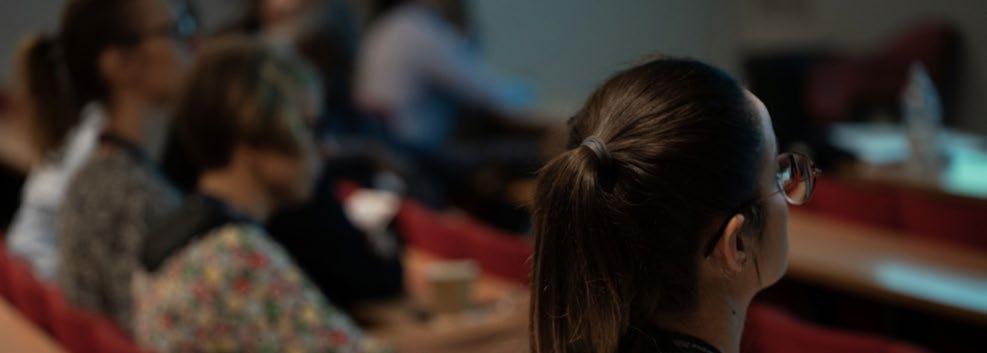
Modular AI in Life Simulation: A Plugin Based Framework for Emergent, Multi-Agent Environments
DR SAFA THARIB SENIOR LECTURER
College of Creative Arts, Technology and Engineering
Developing modular AI game systems poses multiple challenges, especially when the goal is to simulate daily routines, manage physiological needs, and orchestrate interactions among numerous virtual agents. This research project addresses these complexities through a life simulation prototype that incorporates a dynamic day–night cycle, agent timetables, and systemic requirements for eating, sleeping, and maintaining hygiene.
A key innovation is a plugin-based AI architecture developed within the Unreal Engine, offering reusable Blueprint nodes and Behaviour Tree tasks for core functionalities such as pathfinding, goaloriented decision-making, schedule management, and emergent social interactions. This framework also integrates a card-based mini-game (“Kardz”) to demonstrate how agents can switch seamlessly between life simulation behaviours and short, strategic encounters. Complementary to these features, an offline Large Language Model
(LLM) is employed to enable context-aware NPC dialogue, ensuring consistent and adaptive responses over time.
By coupling the AI toolkit with data-driven item crafting and inventory systems, the prototype highlights the potential for an open-ended, emergent gameplay experience that remains grounded in everyday activities and routines. Extensibility and reusability form the foundation of this approach. The modular design enables developers to integrate or swap out specific systems—such as AI tasks for eating and sleeping routines—with minimal re-engineering. Observations of agent autonomy, including timebased schedule adherence and complex interactions driven by physiological needs, underscore how a cohesive, plugin-centred AI solution can support immersive, adaptive, and genre-agnostic simulations.

Considering
photographic poiesis as an empowering and inclusive methodological approach for the practice-researcher
DR ALEXANDRA MURPHY
SENIOR LECTURER
College of Creative Arts, Technology and Engineering
This research considers how innate methodologies might foster inclusive and empowering qualities for the practice-led researcher - both in their contribution to knowledge and in enabling a wider sensory engagement with the work. Photographic poiesis acknowledges both the external (sensory and physical) and internal (tacit and reflective) responses in the making of the work to attain an embodied knowing. This research studies how photographic poiesis became a central characteristic of my practice-research. This emerged via a synthesis of reflective, haptic and tacit methodological approaches, inspired by Michael Polanyi’s tacit knowing, Donald Schön’s reflection -in and -on action and Michelle U. Marks’s haptic visuality.
My research project, On Transience: Memento Mori , was presented at the Conference as a case study – how my utilisation of intrinsic methodologies, combined with a concentrated tactility in the making of the work, helped comprehend the metaphorical and material connections between the photograph and the subject. The project explored photographic representations of the damaged taxidermy specimen via the nineteenthcentury carte-de-visite albumen portrait print and photo-album. The methodological approach and project outputs aimed to express the positive unconscious of knowledge as outlined by Foucault by extending the boundaries of perception beyond the limitations of seeing alone - a resistance to modernity’s demythification, as outlined by Slater, of the world and its reliance on an ocularcentric perception – a trait which, challengingly, is also distinctly photographic.

Decolonising Fashion Education: Activating passive spaces through the white shirt project
NURAAN PETERSEN SENIOR LECTURER
College of Creative Arts, Technology and Engineering
The white shirt project is an educational approach that utilises creativity, technical skills and conceptual thinking in undergraduate fashion programmes. It serves as a fundamental exercise that challenges students to deconstruct and reconstruct the traditional white shirt, encouraging conceptual exploration and technical mastery. Experiential learning theory underpins the project, emphasising learning through doing, and this research is informed by the discourse on dress as a cultural artifact.
This research explores the value of activating the white shirt project to interrogate the role of the white shirt in a wider context. It proposes the integration of multiple perspectives, experiences and knowledges to better inform fashion design pedagogies, and aims to offer the white shirt as a
space that activates critical thinking within a design disciple deeply rooted in colonial, patriarchal and racist structures. The focus of this research is on more inclusive and diverse fashion knowledges - the white shirt project, when critically approached, can serve as a decolonial, anti-patriarchal exercise that subverts traditional norms and embraces diverse perspectives.

Standardising OSCEs in Physician Associate Education: Enhancing Fairness, Reliability and
Research-Informed Assessment Culture
ESIN TURKASLAN ASSOCIATE PROFESSOR
College of Health and Society
The OSCE concept appears to have taken a strong root as an implementation of competency-based assessment method in health education - but there is room for compromise in the primary PA programs in an environment that requires early and reliable evidence of clinical competence and with inherent threats to assessment integrity from variable examiner judgment, different complexity levels of stations, and unconducted marking or calibration of marking.
This research seeks to empower an environment within which assessment in education can be done more justly and evidence informed while at the same time enabling the obstructions. The direct relevance of inconsistency in the examiner's
decision-making and its bearing on the results of the assessment will be studied together with respect to critical consideration of intervention frameworks for standardization such as structured marking frameworks, external quality assurances, and targeted online training for examiners.
This research aims to share key recommendations and implications for institutions and sectors as a whole for embedding fairness in clinical assessment practices. Such reframing of OSCE standardisation as not merely mechanistic but represents an intentional steering force of excellence shaping an inclusive, accountable, and evidence-based educational landscape.
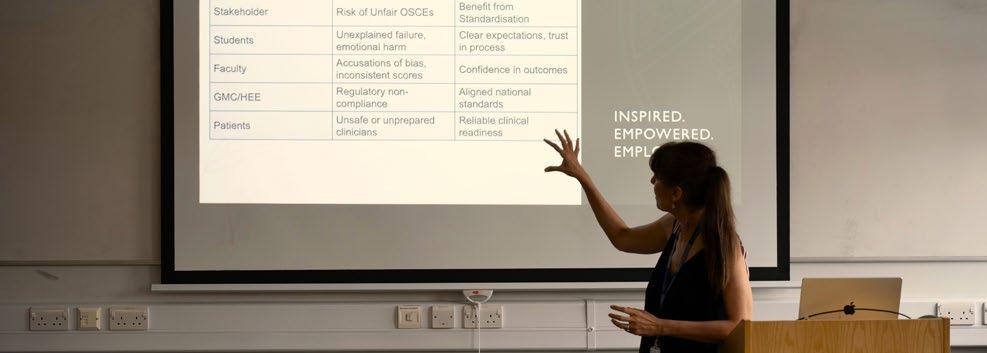
Using ‘photos as elicitation’ as a research method: A live demonstration of its use in understanding gender and power dynamics in the public relations industry
LIZ BRIDGEN HEAD OF ACADEMIC INNOVATION
College of Leadership and Innovation
Photos as elicitation uses previously-taken photographs as prompts to allow people to talk about their daily lives and the stories around them. When using photos, people are prompted to talk about themselves and their experiences of the everyday. This methodology has previously been used by other researchers as a way by which to understand the lives of people with intellectual disabilities and undocumented Latino/ Latina students, and to understand organisational processes. Prior to now it has not, however, been used in public relations research.
This research project involves using personal photos taken in the public relations workplace to prompt memories and views of gender power dynamics experienced by those who worked in the industry.
PROFESSOR SARAH WILLIAMS
PRO VICE-CHANCELLOR
(External Collaborations)
In presenting this research at the Conference we were able to carry out exploratory research live in front of the BNU audience to show how the method can be used to open conversations, aid recall, and to give the interview subject more agency in the conversation.
The audience saw research in action as Liz (a former public relations practitioner, now Head of Academic Practice at BNU Nottingham) showed Sarah Williams (now a Pro-Vice Chancellor at BNU, but a public relations practitioner in the 1990s and 2000s) photos to prompt memories and hear her recollections relating to gender dynamics in the public relations industry. These memories were then used to discuss current issues in the public relations workplace such as genderbased ‘glass ceilings’, the industry’s reputation, and gender expectations.

Achieving Effective Stakeholder Accountability in the Independent Church Sector: A Tripartite Partnership Approach
DR UCHENNA NWEKE SENIOR LECTURER
College of Leadership and Innovation
Independent churches are part of the religious, socio-cultural, and wider charity sector economic structure. Faced with a more secular-leaning operational terrain, these non-denominational, autonomous, and self-governing congregations often achieve static or growing attendance rates, contrary to patterns experienced by mainline church institutions. However, their activities are associated with lingering accountability problematics and questions about the robustness of regulatory frameworks established to monitor their compliance. Recent cases of abuse and financial misconduct in the broader church sector have exacerbated these largely unaddressed concerns.
This research seeks to review key findings from the first UK-wide in-depth study into the accountability and organisational performance of independent churches. Increasingly, many of these congregations are entering affiliations with sector-based Religious Legitimating Agencies (RLAs), as they look to
gain attestation for their accountability and sustain performance in a contemporary and more scrutinous environment. As such, the research objectives involved ascertaining the factors that trigger independent church accountability concerns, and the roles played by both RLAs and external regulators in addressing them. Four RLAs and fourteen independent churches participated as case study organisations.
In providing insights on a framework for achieving effective independent church stakeholder accountability, the research outcomes suggest a need to focus less on more robust external regulation and encourage a tripartite working par tnership involving individual churches, their RLAs and the external regulator. To enable a fundamental element of this partnership, there is a need for the intermediary and self-regulatory role played by RLAs to be recognised as being credible and complementary.

The Experiences of Pakistani Women in Business Entrepreneurship
TOOBA ASIF
POSTGRADUATE
RESEARCH STUDENT
Culture role, family structure and economic factors have greatly influenced the role of Muslim women in society, with Islam being a key force in determining gender dynamics in Muslim nations. The sociocultural environment in which Pakistani women entrepreneurs work is influenced by traditional gender standards, Islamic ideals, and financial limitations. Pakistan maintains one of the lowest rates of gender equality in the world, despite reaching its best level since 2006 at 57.5%, underscoring the pressing need for focused initiatives to increase women's economic involvement.
This research investigates the concept that despite making up over half of the population as female, just 1% of women are entrepreneurs, with their chances concomitantly restricted by structural and societal restrictions. Female entrepreneurship in Pakistan is shaped by a complex interplay of gender roles, Islamic beliefs, and family support. This study adopts a qualitative phenomenological approach to examine the lived experiences of female entrepreneurs in Pakistan and aims to uncover how
Islamic values, cultural norms, and family support influence female entrepreneurship. The study used in this research uses purposive sampling, and semistructured interviews will be conducted for primary data collection, allowing participants to share their insights on key themes, including the influence of religion, family dynamics, gender norms, and the barriers they face.
This research then uses thematic analysis to interpret and identify patterns, offering a comprehensive understanding of the factors shaping female entrepreneurship in Pakistan. The findings of this study will contribute to the literature on female entrepreneurs in South Asia by providing insights into the challenges and support systems that influence Pakistani women's intentions in running a business. By highlighting the role of Islamic teachings, gender norms, and family support, the study aims to inform policymakers, business incubators, and organizations to create an inclusive entrepreneurial environment that fosters opportunities for women.

Reducing Financial Sector Security Challenges by Implementing Zero Trust Architecture (ZTA) in AWS Hybrid Cloud Environment
DR RAFID AL-KHANNAK ASSOCIATE PROFESSOR
College of Creative Arts, Technology and Engineering
SANDYA SRI KANURI RESEARCHER
As financial institutions increasingly adopt hybrid cloud environments, traditional perimeter-based security models have become insufficient in addressing evolving cyber threats. Zero Trust Architecture (ZTA) offers a transformative security paradigm by adhering to the principle of "never trust, always verify," where every user, device, and application is continually authenticated and authorized before access is granted, regardless of their location within or outside the network.
ZTA enforces strict identity verification, continuous authentication, least-privilege access, and microsegmentation to ensure comprehensive security. This study explores the complexities of integrating ZTA within financial organizations, particularly in environments with legacy infrastructure and
multi-cloud deployments. Utilising an Agile research approach, the study systematically evaluates critical security components, identifies technical and operational integration challenges, and examines the regulatory implications of adopting ZTA.
The findings of this research contribute to the advancement of cybersecurity practices by identifying key obstacles and proposing strategic solutions to optimize ZTA deployment. By enhancing existing security frameworks and establishing best practices, this research provides financial institutions with a structured approach to strengthening their security postures while ensuring compliance and operational efficiency.
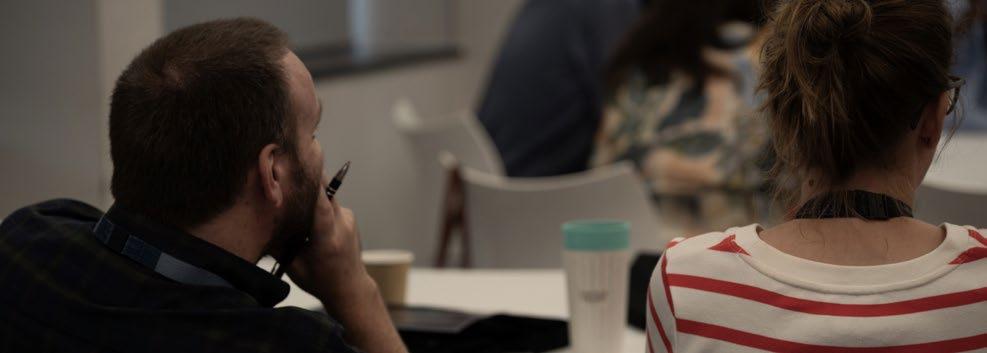
Utilising the Zero Trust Risk Assessment Framework (ZTRAF) to enhance AI-Driven Cloud Services in multi-Cloud Platforms
DR RAFID AL-KHANNAK ASSOCIATE PROFESSOR
College of Creative Arts, Technology and Engineering
The Zero Trust Risk Assessment Framework (ZTRAF) helps bridges a gap in cyber security by giving organisations practical means to secure AI systems in complicated public multi-Cloud and Hybrid Cloud Environments. The ZTRAF does this through securing robust meeting regulatory compliance requirements and maintaining continuous business across numerous operational environments. The modularity application follows an incremental pattern, beginning in high-risk areas.
This practical aspect makes ZTRAF usable by organisations with limited resources without putting security posture at risk. This research introduces the ZTRAF as a cutting-edge method for securing AI-trained cloud services by identifying specially several engineered weaknesses of machine learning in the distributed cloud, including adversarial attack and data poisoning. Based on the "never trust, always verify" approach, the ZTRAF integrates
FAYAZ KHAN RESEARCHER
continuous authentication, least-privilege access controls and real-time monitoring specifically designed for AI workloads. The framework has been evaluated across the healthcare, finance, and manufacturing domains with very strong outcomes – 70% successful adversarial attack protection and 60% data poisoning shielding.
The ZTRAF system detected incoming threats within 30 seconds remaining at 95% regulatory compliance rates, and deals with several major issues which researchers encountered during implementation, including micro-segmentation scalability, performance slowdowns and multi-cloud deployment. The approach to AI security in the ZTRAF goes beyond just perimeter protection by implementing comprehensive data validation at every ingestion point, behaviour monitoring for anomalous patterns, and explainable AI techniques for greater transparency.

Self-Healing Intent-Based Networking: A Machine Learning Approach for Autonomous Fault Recovery
DR ESTABRAQ MAKIYAH
LECTURER
College of Creative Arts, Technology and Engineering
Intent-Based Networking (IBN) is revolutionizing network management by enabling high-level policy-driven automation. However, traditional IBN implementations struggle with handling unexpected failures, often requiring manual intervention. This paper proposes a Self-Healing Intent-Based Networking (SH-IBN) framework that leverages Machine Learning (ML) for autonomous fault detection and recovery .
Our approach integrates Supervised Learning for anomaly detection and Reinforcement Learning (RL) for adaptive self-healing within an SDNbased IBN environment. We evaluate our model
using Mininet and Ryu controller, simulating realworld network failures such as link disruptions, congestion, and misconfigurations . Experimental results demonstrate that SH-IBN significantly improves overall network availability compared to static recovery mechanisms. These findings highlight the potential of AI-driven self-healing in making IBN more resilient and autonomous.

Enhancing Engineering Participation Through Blended Learning
RAVINDER KAUR
POSTGRADUATE RESEARCH STUDENT
The advancement of remote access learning systems has markedly transformed the educational landscape, particularly in engineering disciplines. These systems enable blended learning, which combines traditional face-to-face classroom methods with online educational technologies.
This research addresses the critical challenges in developing educational curricula and training programs that equip individuals with the necessary skills and knowledge for success in the field of robotics. To achieve this, several key initiatives are proposed. Initially, the potential of emerging technologies in robotics education will be explored to enhance learning experiences within smart classroom settings. By integrating robotics education with these advanced environments, learners will benefit from hands-on, interactive experiences, fostering deeper understanding and skill development.
Additionally, remotely accessed system for teaching a blended robotics course is proposed to ensure broader accessibility and adaptability across diverse educational contexts. These initiatives aim to bridge the gap between current educational practices and the dynamic demands of the rapidly evolving robotics industry. As engineering education continues to progress, remote access learning systems play a pivotal role in promoting innovative, effective, and adaptable learning experiences that prepare students for the complexities of modern engineering challenges.
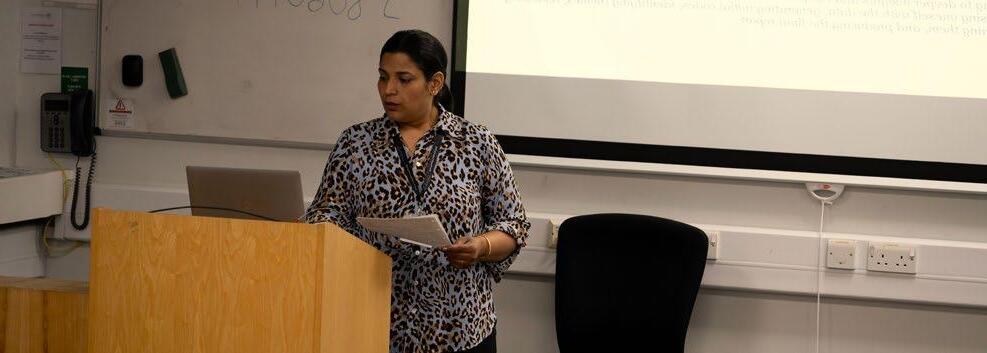
AI-Driven Phishing Detection by utilising Natural Language Processing (NLP) to Enhance Phishing Intelligence on X (Twitter)
DR RAFID AL-KHANNAK ASSOCIATE PROFESSOR
College
of Creative Arts, Technology and Engineering
Phishing scams continue to pose a significant threat in the digital space, with cybercriminals constantly refining their tactics to exploit individuals and organisations. Traditional phishing intelligence approaches have primarily relied on static datasets and reactive strategies, which often fail to keep pace with rapidly evolving threats. To address these limitations, CyberTweet has been developed as an AI-driven system that leverages Natural Language Processing (NLP) and Topic Modelling to enhance phishing intelligence by analysing public discourse on X (formerly Twitter) social media platform.
This research focuses on processing large-scale unstructured data to extract meaningful insights into phishing trends, public sentiment, and thematic discussions. The methodology has involved systematic data collection from X media, followed
DUNEESHA HEWA RESEARCHER
by pre-processing techniques such as tokenisation, stop word removal, and lemmatisation to clean and standardise the text. Sentiment analysis has been applied to classify tweets into positive, negative, and neutral categories, where positive sentiments indicate trust or support for phishing prevention, negative sentiments highlight risks or dissatisfaction, and neutral sentiments provide informative discussions. To further refine phishing intelligence, Latent Dirichlet Allocation (LDA)-based topic modelling has been incorporated to uncover hidden patterns within the data. The extracted topics have been visualised using inter-topic distance maps and term frequency distributions, enabling a structured interpretation of dominant phishingrelated discussions.

Developing a Security Framework for IoT Devices in the Healthcare Sector: A Focus on the NHS UK
GUNJAN GUPTA
Postgraduate Research Student
DR RAFID AL-KHANNAK ASSOCIATE PROFESSOR
College of Creative Arts, Technology and Engineering
The increasing integration of Internet of Things (IoT) devices in healthcare has significantly improved patient care and operational efficiency, particularly within NHS. However, these advancements come with substantial cybersecurity risks, as vulnerabilities in medical IoT devices can lead to data breaches, unauthorised access, and system disruptions. This research critically examines the security flaws and vulnerabilities in IoT/IoMT devices used by the NHS, utilising the survey data and case studies to propose a secure and reliable cybersecurity framework.
DR
BENJAMIN AZIZ ASSOCIATE PROFESSOR
College of Creative Arts, Technology and Engineering
DR
SHAHADATE REVZY SENIOR LECTURER
College of Creative Arts, Technology and Engineering
This research aims to identify key risks, analyse the current security situation and gaps, and develop a comprehensive guideline for healthcare staff, policy makers and IoT manufacturers. The expected outcomes include a structured framework, a testing manual for implementation to solve the real problems, and improved policies to enhance NHS cybersecurity resilience and protection for patient data.

FEM-Guided Design and Validation of High Precision Ultrasonic Horns for Advanced Manufacturing Applications
DR. RAJESH MADARKAR LECTURER
College of Creative Arts, Technology and Engineering
Ultrasonic horns are pivotal components in highfrequency vibratory systems, responsible for amplifying and directing ultrasonic energy with extreme precision. Despite their wide industrial adoption, conventional horn designs remain limited by heuristic approximations and iterative trial and-error methods that are both time-intensive and prone to detuning. This research presents a comprehensive, simulation-driven methodology for the development of high-performance ultrasonic horns tailored for advanced machining applications such as Ultrasonic Vibration-Assisted Grinding (UVAG) and Ultrasonic Minimum Quantity Lubrication (UMQL).
The approach taken by this research integrates analytical modelling, finite element analysis (FEA), and experimental validation in a closed-loop design process. Resonance length estimations are initially derived using elastic wave propagation theory, followed by the creation of parametric CAD models. Modal and harmonic simulations
PROFESSOR SABUJ MALLIK
ASSOCIATE DEAN (RESEARCH)
College of Creative Arts, Technology and Engineering
are conducted in ANSYS Workbench to ensure accurate tuning to a target frequency of 20 kHz, while simultaneously optimizing amplitude gain and minimizing stress concentrations. The entire horn-workpiece assembly is modelled as a coupled structure to capture realistic dynamic behaviour under operational conditions. Following simulation, the horn is fabricated with high-precision machining, and its dynamic characteristics are verified using frequency analysers and SolidSQUAD software.
Discrepancies between simulated and actual performance are systematically addressed through iterative refinement, ensuring full compatibility with the ultrasonic transducer system. The research demonstrates a scalable and replicable framework for the rapid development of application-specific ultrasonic horns, significantly advancing the stateof-the-art in ultrasonic tool design. The outcomes promise enhanced machining performance, reduced development cycles, and increased reliability across a range of high-precision manufacturing domains.
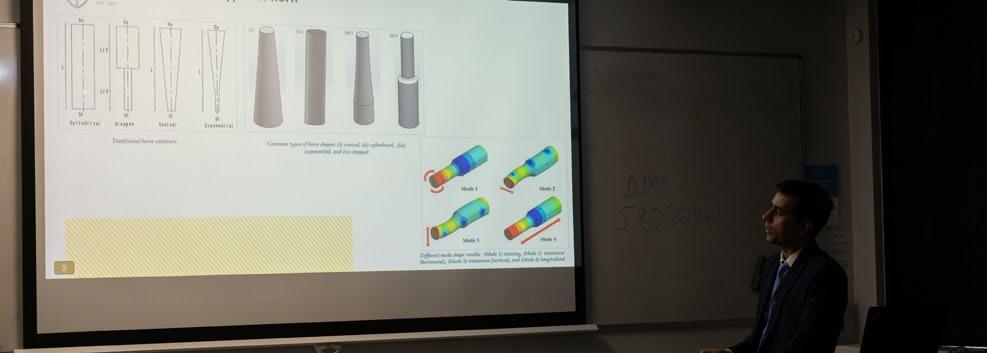
Breaking Barriers: A Comparative Analysis of Women’s Leadership in Higher Education in Nigeria and the UK
PROFESSOR ADETORO A ADEGOKE
ASSOCIATE DEAN (RESEARCH)
College of Health and Society
ELIZABETH F OJO
AFE BABALOLA UNIVERSITY, NIGERIA
Dionne Spencer
Despite global efforts to promote gender equality, women remain underrepresented in senior leadership roles in higher education institutions (HEIs). The diversity in higher education leadership research examines the barriers, opportunities, and systemic challenges faced by women seeking leadership positions in HEIs in Nigeria and the UK. Through a comparative analysis, the study explores the cultural, institutional, and policy frameworks influencing gender diversity in leadership across both regions.
This research uses a mixed-methods approach that incorporates survey data from female leaders and aspiring leaders in HEIs and qualitative interviews with university executives, policymakers, and gender
DIONNE SPENCER
DEAN OF STUDENTS
Buckinghamshire New University
ADENIRAN AFOLALU
Afe Babalola University, Nigeria
advocacy groups. Key findings highlight challenges such as gender bias, work-life balance conflicts, lack of mentorship, and institutional policies that impact career progression for women in academia. The study also identifies best practices from both countries that have successfully fostered genderinclusive leadership.
This research proposes evidence-based strategies, including leadership training, mentorship networks, and policy recommendations to support women in higher education leadership. By presenting crosscultural insights, the study contributes to the ongoing global dialogue on diversifying leadership in HEIs and promoting sustainable institutional change for gender equity.
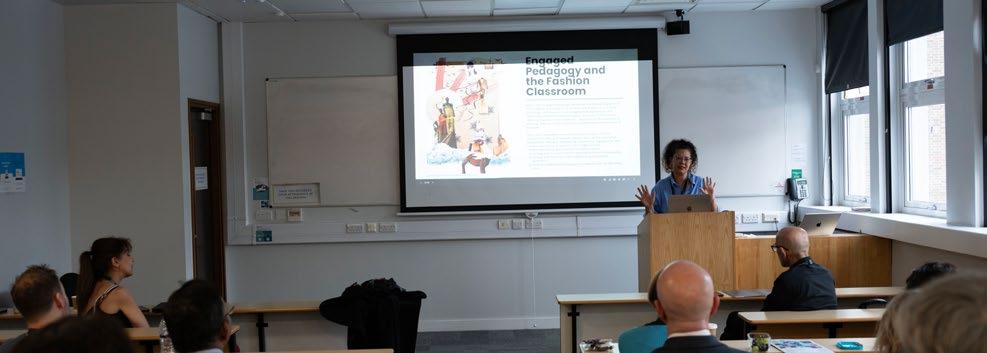
Improving access to nutritious food for migrants from disadvantaged backgrounds: A Rapid Evidence Assessment
ALEXANDRA CONSTANTINESCU SENIOR LECTURER
College of Leadership and Innovation
DR NAZ ALI ASSOCIATE PROFESSOR
College
of Leadership and Innovation
This research utilises a Rapid Evidence Assessment (REA) to investigate the health and societal impacts of limited access to healthy food among two main categories of migrants in the UK – in the first case voluntary migrants living in low-income households and secondly forced migrants, with a specific focus on asylum seekers. It examines real-world challenges and opportunities as well as scientific evidence related to the effectiveness of various policy interventions in increasing access to, and consumption of, healthy food for disadvantaged migrants.
This research contributes to the critical study of food policy in the context of voluntary and forced migration. It paves the way towards establishing a dialogue with policymakers to drive positive change within migrant communities, and to ensure positive health outcomes for migrants by enhancing food availability and establishing access to food of adequate nutritional value. The study provides evidence-based policy recommendations aimed at improving access to, and availability of, healthy food to disadvantaged migrants, reducing health and social inequalities among these categories of population.
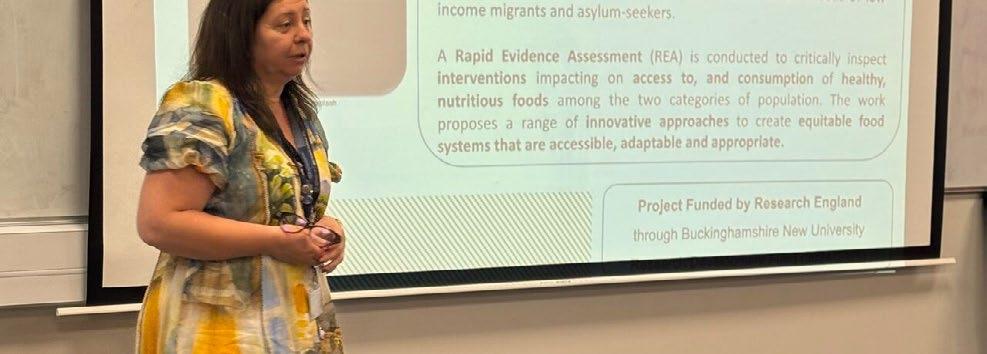
Ethical Scoping of a Sensitive Archive: Facilitating Inclusive and Widening Knowledge Exchange
DR CIARAN O’KEEFFE ASSOCIATE DEAN (EDUCATION)
College of Health and Society
KATRINA HEATH
LECTURER
College of Health and Society
This research explores the scoping of a newly acquired, extensive archive of a highly sensitive nature which presents a unique opportunity for forensic psychology and archival research in offering insights into criminal motivations, while also addressing the ethical and practical challenges of developing an accessible collection. Currently, the archive remains inaccessible, with potential deterioration risks, necessitating immediate intervention to ensure preservation and usability.
This research aims to determine which parts of the archive can be processed and catalogued for access by staff, students, and external researchers. Additionally, risk assessment, GDPR concerns, digitising and redaction issues will be considered in order to manage ethical concerns and ensure responsible usage. An archivist has been employed to provide recommendations on storage improvements, preservation requirements, documentation control, and compliance with
DR NICOLA MALLOWAN SENIOR LECTURER
College of Health and Society
relevant legislation, and a forward plan will outline an action strategy, including low or no-cost measures for sustainable archival development.
Following collation of the research report data by the archivist, findings will be presented at the research conference upon completion of the project. Future research outputs from this piece of work will include publications and conference discussions on the ethical challenges of working with sensitive materials, such as emotional impact, risk management, victim considerations, and trauma-informed practices.
This project positions the University as a national leader in ethically and inclusively developing sensitive archives, setting a precedent for other institutions. Collaboration with leading organisations and local community groups enhances civic engagement and knowledge exchange, fostering extensive research opportunities and interdisciplinary collaborations within forensic psychology and archival studies.

Exploring perspective of stroke survivors about sedentary behaviour
TIMOTHY ISHAKU SENIOR LECTURER
College
of Health and Society
DR YETUNDE DAIRO ASSOCIATE PROFESSOR
College of Health and Society
Persons who have had stroke often experience significant changes in their physical and cognitive abilities, which can lead to increased sedentary behaviour. Understanding their views on this issue is important for developing effective interventions to reduce or break their participation in sedentary behaviour and improve overall health outcomes.
This research employed a qualitative approach using semi-structured interviews. The interview guide, informed by the Theoretical Domains Framework and the Capability, Opportunity, and Motivation Behavioural (COM-B) model, include questions about daily routine, sedentary behaviour, factors influencing it, and strategies for reduction. Participants were recruited from GP practices, rehabilitation centres, stroke associations and community support groups. The data was analysed using thematic analysis.
DR FIONA MCCORMACK EXTERNAL RESEARCH SUPERVISOR
The preliminary findings revealed that stroke survivors face multiple challenges in reducing sedentary behaviour, including physical limitations, lack of motivation, and insufficient support. Many participants expressed a desire to be more active but felt constrained by their post-stroke sequalae. Additionally, psychological factors such as fear of falling and low self-efficacy were identified as significant barriers.
The unique perspectives of stroke survivors highlight the need for tailored interventions that addressed facilitators to sedentary behaviour among stroke survivors.
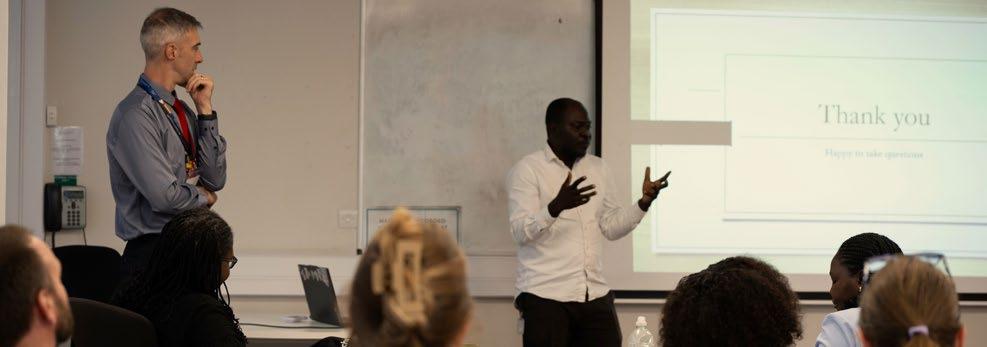
The High Wycombe Heritage Trail: Researching the use of a smartphone app to promote walking for health and engagement with place
DR ALAN HOCKLEY
Student Achievement and Success Lecturer
It is suggested that mobile devices can act as mediators for co-ordination between individuals and environment and so such mediated experiences can promote a sense of place through exploration of both the real and virtual. Furthermore, there appears to be some self-reported evidence that those using digital interventions such as on a mobile app increased physical activity and walking compared to those who did not use such interventions.
In collaboration with Buckinghamshire Council and using their Love Exploring app accessed through smartphones, a guide was developed for a circular walking trail of 3.5km around the Rye and through the town centre. It incorporates an audio commentary which provides directions and explanations of points of interest along with accompanying images of heritage sites. The app was piloted in October 2024 to test its application and to gain feedback prior to a full launch in 2025.
DR FIONA MCCORMACK
External Research Supervisor
This research reports on the project as a work in progress, providing some insight into its two aims: to promote physical activity among the adult population and to research the efficacy of using such digital Apps in reducing barriers to exploring their local environment. The project has showcased civic engagement in several ways, including: the co creation of the trail, contribution to the Buckinghamshire Physical Activity Strategy through behaviour change, and participation in community events.
To be authentic to our purpose, this presentation was delivered by offering delegates the opportunity to join a guided walk on part of the High Wycombe Heritage Trail.

Health, Wellbeing, and Social Justice
A Transdisciplinary Exploration of Commercial Sex Work in the Local Community: Examining
PROFESSOR ADETORO ADEGOKE
ASSOCIATE DEAN (RESEARCH)
College of Health and Society
DR NICOLA MALLOWAN
SENIOR LECTURER
College of Health and Society
Commercial sex work (CSW) is a globally recognised yet highly stigmatised form of labour that intersects with issues of health inequalities, social exclusion, gender-based violence, and economic precarity. Women engaged in CSW often experience systemic barriers in accessing healthcare, social support, and legal protection due to criminalisation, social stigma, and institutional discrimination. These barriers contribute to adverse health outcomes, increased exposure to violence, and limited access to essential services.
ALISON PEARCE LECTURER
College of Health and Society
SUSAN PERRYMAN
SENIOR LECTURER
College of Health and Society
KAREN FERGUSON
OPERATIONS MANAGER
Connection Support
This research highlights the aims and anticipated outcomes of the research, providing a comprehensive understanding of CSWs' experiences. Findings will be used to guide local services, charities, and policymakers in developing inclusive, evidence-based, and effective support systems. In the long term, this research aims to contribute to reducing stigma, fostering inclusivity, and improving the quality of life for women engaged in CSW. Ongoing data collection will further refine these insights, with findings presented at the conference.

Inclusivity in Practice Education: The Views and Experiences of Nurse Educators Supporting Nursing Students With Mental Health Needs in Mental Health Clinical Placements
MARGARET RIOGA DIRECTOR OF STUDENT SUCCESS
This research explores the perspectives and experiences of Nursing Practice Supervisors and Assessors, referred to as Nurse Educators, regarding their support for students with mental health needs during mental health clinical placements. This research employed a qualitative survey design in order to delve into Nurse Educators' views and experiences at two Mental Health Trusts in the Southeast of England, UK.
As part of this research thirty-five Nurse Educators, comprising Practice Supervisors and Practice Assessors from two National Health Trusts involved with providing placements for two universities in the Southeast of England, responded to the survey.
Factors which facilitated and inhibited Nurse Educators efforts to supporting students' mental health needs during placements were identified. They encompassed personal, professional, and procedural issues which were intricately intertwined to support students with mental health needs. While most Nurse Educators expressed a willingness to support students with mental health needs, challenges regarding the reasonableness of adjustments and their impact on Nurse Educators' practice were widely reported.
This research has led to recommendations that include a review of learning arrangements, guidelines, and policies for students with mental health needs in clinical placements, as well as tailored training of students' inclusive needs for Nurse Educators.

Current clinical assessment of patellofemoral alignment in patients with anterior knee pain Healthcare
and Social Care
DR KEVIN CAMPBELL-KARN
HEAD OF GRADUATE OUTCOMES
Learning Enhancement and Academic Practice
While patellofemoral pain (PFP) is one of the most common knee complaints and appropriate clinical assessment is important for onward referral there is a lack of consensus for how to clinically assess patellofemoral positioning. This research explores the issues with knee pain and how it is assessed clinically to establish if current methods used are of use to the working hypothesis of a clinical diagnosis, and seeks to identify current clinical assessment methods within musculoskeletal assessment and subsequent referral for radiological assessment.
As part of this research questionnaires were distributed to Physiotherapists and Sports Therapists to ascertain current assessment methods and radiological referral. Of the 119 responses, clinical history was the most commonly used
assessment method while observation of the position of the patellar position was the most common physical assessment method. 70% of therapists referred for imaging with MRI being the most common type. Clinical assessment requires greater clarity of the commonly used clinical tests with the need for an objective, valid and reliable method to improve clinical testing and reduce the need for imaging.

The Inclusive Nature of Community-Driven Research: Exploring Health and Social Inequalities Among Commercial
Sex Workers Health, Human and Social Sciences
SUSAN PERRYMAN
SENIOR LECTURER
College of Health and Society
PROFESSOR ADETORO
ADEYEMI ADEGOKE
ASSOCIATE DEAN (RESEARCH)
College of Health and Society
Research on health and social inequalities among commercial sex workers (CSWs) remains significantly underdeveloped in the UK. Existing studies highlights substantial gaps in service provision, policy engagement and institutional support, leading to exacerbated physical and mental health disparities, heightened exposure to violence and exploitation, and barriers to healthcare access. Despite these challenges, CSWs often remain excluded from mainstream health and social policy discussions.
This research highlights the importance of inclusive research and participatory research in amplifying marginalised voices, addressing health and social
DR NICOLA MALLOWAN
SENIOR LECTURER
College of Health and Society
ALISON PEARCE
LECTURER
College of Health and Society
inequalities, challenging stigma, improving service accessibility, empowering communities, and fostering sustainable interventions. This study also aims to build research capacity among early and mid-career researchers across health and social sciences, strengthening civic engagement with local stakeholders.
Through co-design and intersectional approaches, this research seeks to develop sustainable, equityfocused interventions that address health disparities, improve service accessibility, and contribute to longterm systemic change.
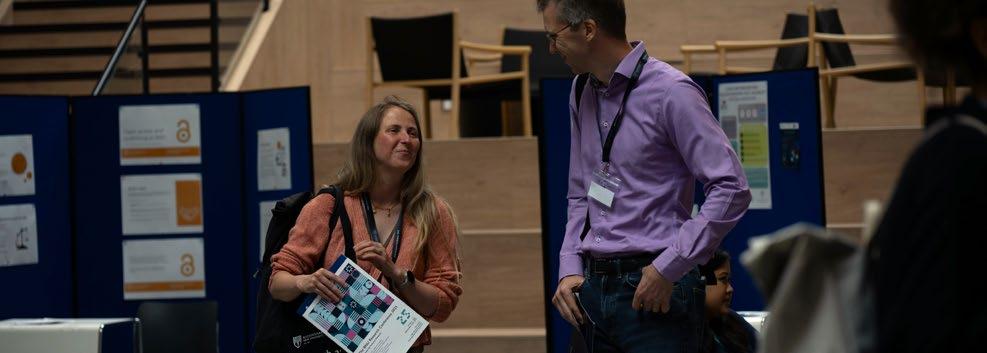
An Investigation into the Underrepresentation of Ethnic Minority Police Officers in Specialised Units in United Kingdom (UK) Police Services
MOHAMED OMAR MOHAMED
SENIOR LECTURER
College of Leadership and Innovation
The underrepresentation of ethnic minorities within specialised units in the UK police services remains a persistent issue, despite various diversity initiatives undertaken in policing. The purpose of this research is to critically investigate underrepresentation of ethnic minority officers in specialised units in the UK Police Service. This research adopts a qualitative methodology by applying phenomenological and critical realism theory, utilising the Interpretative Phenomenology Analysis (IPA) to analyse semi-structured interviews of existing serving officers from ethnic minority backgrounds and senior police officers who are decision makers in recruitment using purposive sampling to
capture personal narratives in order to offer insights into the perceptions and experiences of entry or within specialised units, factors that contribute to the underrepresentation, and the effectiveness of recruitment strategies and initiatives in facilitating their entry into specialised police units.
The findings are expected to contribute to the existing literature as empirical evidence regarding the barriers to the underrepresentation of ethnic minority officers in the UK, improvement of recruitment, retention and progression of ethnic minority officers, as well as to inform the policy makers and police leadership on fostering diversity within specialised units.

Action-research to address current development funds shortfall as it relates to environmental and food security
DR RACHEL TATE
LECTURER
College of Leadership and Innovation
DR JOEL WEAVER LECTURER
College of Leadership and Innovation
The pausing and expected total withdrawal of US Agency for International Aid (USAID) development funds/services (the largest national contribution to One Acre Fund in Kenya) is potentially devastating to developing nation states. This research evaluates the implications of this retrograde policy in Kenya through the eyes of The One Acre Fund, a westernbased development NGO that secures finance from multiple donors. USAID is a significant contributor to the fund in Kenya, allocating circa £2m per annum. The charity works with families throughout sub-Saharan Africa to develop and maintain an acre of farmland per family. This includes advice, timely scientific knowledge and the provision of suitable seeds and plants as well as small livestock.
EVANS GITONGA
Postgraduate Research Student
The researchers foresee the short-term results as complex and involving difficult decisions of where to disinvest; however, creative solutions may be found by not eliminating projects, but providing minimum advancement, new collaboration between projects and exploring ways to replace funding. In the longer term, new strategic partners may be discovered with a focus on more transactional initiatives. Presently, states or organisations who are willing to make these longer commitments tend to be those that are aiming to increase their soft power across the globe for example China and other states with extensive Sovereign Wealth Funds. Just as development aid for Africa has been skewed in this direction, western-funded projects may also go this way, particularly over the period of the Trump Presidency. This research will test this trend and explore themes emerging from the research data.

Complexity of Ethical Decision Making for UK Emergency Managers – How truthfully?
BEVERLEY GRIFFITHS SENIOR LECTURER
College of Leadership and Innovation
This research critically examines whether a codified ethical framework can support decision-making in high-pressure, multi-agency environments. Grounded in complexity theory and poststructuralism, the research challenges traditional reductionist models and adopts a preparadigmatic stance to understand how diverse actors, individuals, organisations, and communities, interact and adapt amidst uncertainty and competing values.
Using a Rigorous Mixed-Method (RMM) explanatory-sequential design, this research integrates quantitative surveys on moral identity with qualitative interviews and policy analysis. This methodological approach enables a nuanced investigation into how ethical decisions are shaped by emotional, cognitive, and contextual factors.
The study highlights the limitations of static ethical codes and advocates for flexible, context-sensitive frameworks that incorporate emotional insight, scenario-based training, and inclusive dialogue.
The research’s key themes include the socially constructed nature of truth, the role of moral identity in shaping ethical behaviour, and the influence of organisational culture and public trust. Real-world cases such as Grenfell, COVID-19, and 7/7 underscore the importance of transparency, fairness, and ethical resilience. Griffiths proposes that ethical decision-making must be embedded across all phases of emergency management— from planning to recovery, and supported by interdisciplinary research, adaptive leadership, and culturally sensitive communication.

A Novel Multidomain Argumentation Framework for Legal Analysis
CLIVE BLACKWELL ASSOCIATE LECTURER
College of Creative Arts, Technology and Engineering
Many miscarriages of justice have occurred because of the failure to apply sound and reliable reasoning to evidence. Argumentation has been widely used in legal analysis to adjudicate rationally between both sides of an argument. This research utilises a multidomain argumentation framework that includes five domains which, in order, comprise the legal, organisational, financial, digital, and physical domains. The legal domain builds upon the arguments and evidence in the lower domains that have their own reasoning modes using different permitted evidence.
The model is applied to the prosecutions of around 1,000 postmasters for false accounting and fraud, which was possibly the worst miscarriage of justice in UK history. The analysis reveals that multiple unsound arguments were presented in and between every domain by the Post Office and Fujitsu, who supplied the Horizon accounting system.
The multidomain model also has implications for physical forensics, as courts have often accepted unsound expert evidence with disastrous consequences, with recent cases involving Oliver Campbell and Lucy Letby.

Breaking’s Olympic Baptism of Fire: The Influence of the Judging System on Breaking’s Olympic Legacy
SONJA CIMELLI POSTGRADUATE RESEARCH STUDENT
Breaking, the original dance style of Hip Hop culture, made its Summer Olympics debut at Paris 2024. Historically, judged artistic sports such as gymnastics have been vulnerable to judging system scandals. For Olympic inclusion, subcultural sports such as skateboarding are reliant on the formalisation of culturally derived judging systems, which have equally been prone to controversy. Culturally, a singular universal breaking judging system does not exist, indeed two judging systems were used in breaking’s Olympic qualification process. This research aims to examine the influence of the judging system on the perceptions of breaking as an Olympic sport and increase knowledge regarding the significance of judging systems on the transition of subculture activity to mainstream sport.
Theoretically oriented by Actor-Network Theory (ANT), an ANT-inspired ethnographic process was adopted. Research methods included document analysis, interviews and observation, theoretically complemented by constant comparative analysis. Data collection spanned an 18-month period, pre-, during and post-Paris 2024.
The results demonstrated the significance of accessibility, cultural authenticity, communication and trust between stakeholders. The research also highlighted the impact of changing a judging system, particularly mid-Olympic qualification cycle. It further exposed the confusion surrounding how Olympic breaking was judged and the impact on the perception of breaking as an Olympic sport. Breaking introduced a novel approach to the adjudication of judged sports, and this research exposed a novel paradigm through which judging systems can be viewed. The relational networks revealed key stakeholders surrounding the judging system and foregrounded the political associations that have both influenced and been influenced by the judging system through the translation of power.

‘The monochrome man’: An exploration into Dennis Nilsen’s lived experiences of a paraphilic disorder and its origins
DANIEL RILEY POSTGRADUATE RESEARCH STUDENT
This research is centred around previously unseen and unread diaries, letters, poems and other material created by the serial killer Dennis Nilsen during his imprisonment from 1986 until his death in 2018. The aim is to apply a Narrative Analysis exploring Nilsen’s live experiences of a paraphilic disorder (sexually deviant interests that cause death or harm to others), in an attempt to better comprehend the meaning behind these seemly random yet similar 12 murders, while applying a therapeutic lens when assesses the origin and formation of said paraphilias in the context of prior adverse childhood experiences (ACE’s) such as physical abuse and neglect.
The findings of this research are expected to help to evidence the congruence between ACE’s and maladaptive compulsive coping mechanisms, in addition to shedding light on a far wider context regarding male sexual abuse and the sociocultural context in which it sits.

The Nature of Environmental Security in Foreign Relations: The Case of AngloKenyan Foreign Policy in the Twenty-First Century
EVANS GITONGA POSTGRADUATE RESEARCH STUDENT
This research critically examines the intersection of environmental security and foreign relations, with a focused case study on the Anglo-Kenyan foreign policy dynamics in the twenty-first century. As the global geopolitical landscape is increasingly being influenced by environmental threats such as climate change, resource scarcity, and ecological degradation, the study interrogates how these environmental issues inform and shape the diplomatic and policy interactions between the United Kingdom and Kenya. Employing a qualitative methodology, this research analyses key policy frameworks, diplomatic correspondence, multilateral agreements, and institutional collaborations between the two nations and engages experts with lived experiences in in-depth interviews to harness their knowledge.
Examining the case of Anglo-Kenyan relations, the study will seek to provide empirical evidence of how environmental concerns, ranging from climate
adaptation to natural resource management, are leveraged as both a tool for bilateral cooperation and a means of advancing national interests. Furthermore, it situates the Anglo-Kenyan case within the broader discourse on international environmental governance, identifying the ways in which environmental security reshapes foreign policy paradigms in the context of shifting power relations and the evolving global climate agenda.
Ultimately, the findings will seek to contribute to the growing body of literature on environmental diplomacy and security studies, offering new perspectives on the role of environmental factors in shaping foreign policy, conflict resolution, and sustainable development in the twenty-first century. This research underscores the growing importance of environmental security as a pivotal dimension of international relations and global governance.

Dissecting the anatomy of social risk: Disentangling the health inequalities in the UK through the Intersectional Risk Lens
BRIDGET MAKANDE
POSTGRADUATE RESEARCH STUDENT
Existing systems of marginalisation create and exacerbate intersectional social harm and vulnerabilities. In the UK, whilst the pandemic illuminated and exacerbated the disproportionate vulnerability risk for marginalised communities, preexisting policy trajectories influenced and shaped the impact and the patterns of the COVID-19 pandemic. This research explores the experiences of older minority ethnic people in the UK throughout and after the COVID-19 pandemic. Data is drawn from focus groups, one-on-one interviews with older people, and individual interviews with community leaders. This research synergises intersectionality and risk theory to facilitate a nuanced analysis of these communities' heightened risks and vulnerability.
Data analysis reveals the diverging effects of multigenerational living during the pandemic. On the one hand, multigenerational living was a protective factor that aided in reducing the older people’s risk of loneliness, although multigenerational living was a risk factor because it exposed older people to the heightened risks of COVID-19 infections from younger family members. Whilst older people appeared to cope due to their eudemonic values, which embrace collectivism, the absence of resources to support them manage their daily vulnerabilities (including managing the risk posed by living in multigenerational living households, informal grandchild care, cost-of-living crisis, and digital exclusion), exposes them to heightened vulnerability. Their resilience is not an antidote to their vulnerability. Instead, institutional forms of support are key to ensuring sustainable resilience, positive ageing trajectories, and positive health outcomes, especially since social risk is embedded in contemporary and future rising uncertainties.

Research at BNU Research at BNU
Conferences
Alexandropoulou, Marianthi (2025) Exploring Nurses' perceptions of Artificial Intelligence: A review of knowledge and attitudes among Registered and Student Nurses. In: 30th ICN Congress 2025 "Nursing power to change the world", 9th - 13th June 2025, Helsinki, Finland.
Aziz, Benjamin, Oragwu, U and Tharib, S (2025) Requirements Cube: Towards a Matrix-based Moel of Requirements. In: 20th International Conference on Software Technologies, 10 - 12th June 2025, Bilbao, Spain.
Brescia, Charles (2025) Group work: Encouraging student engagement via colleague evaluations. In: Teaching and Learning Conference 2025: Future-focused education: Ensuring successful student outcomes for all, 2nd July 2025, University of Sheffield.
Chalk, Fiona (2025) Improving support for people with Dementia – an introduction for nonspecialists. In: World Federation of Neuroscience Nursing Conference,, 23 July 2025, Darwin Conference Centre, Australia.
Chalk, Fiona and Trout, Ruth (2025) Inclusion through simple activities in online CPD modules. In: Buckinghamshire New University Research and Enterprise Conference 2025, 3rd July 2025, Buckinghamshire New University, High Wycombe.
Chan, Marco (2025) Adaptive Training Strategies for Neurodiverse Student Pilots. In: ICAO Workshop for Aviation Universities, 10th - 11th April 2025, Universidad Politecnica de Madrid, Spain.
Chan, Marco (2025) Adaptive Training Strategies for Neurodiverse Student Pilots. In: ICAO Workshop for Aviation Universities, 10th - 11th April 2025, Universidad Politecnica de Madrid, Spain.
Cimelli, Sonja (2025) Breaking's Olympic Baptism of Fire; the Influence of the Judging System on Breaking's Olympic Legacy. In: The 7th Annual Conference for the Centre of Sociocultural Sport and Olympic Research, 13th-14th March 2025, California, USA.
Constantinescu, Alexandra (2025) Voucher-based interventions to increase food access and food security for low-income migrants settled in England – A Rapid Evidence Assessment. In: International Food Security and Sustainable Agricultural Trade Summit, 7-8 April 2025, University of East London, London.
Durna, Tuncay (2025) Reluctance to Use Necessary Force: Emerging Concern within the Police. In: British Society of Criminology Annual Conference, 1 - 4th July 2025, University of Portsmouth. (In Press)
Faye, Sainey (2025) Developing a Human Factor Corporate Governance Model for Banking Sustainability: A Grounded Theory Approach. In: Reshaping Africa's Sustainable Development through Digital Inclusion, 20th - 24th May 2025, Africa.
Faye, Sainey and Yamoah, Fred A. (2025) Reshaping Africa’s Sustainable Development through Digital Inclusion. In: The Academy of African Business and Development 25th Conference, 20th May 2025, University of the Witwatersrand, Johannesburg, South Africa.
Ibrahiim, Kalimah (2025) Reimagining Institutions: Health Equity for NEET Populations. In: Health Humanities Consortium Conference 2025, 2-5 April 2025, Thomas Jefferson University, Philadelphia, USA.
Ibrahiim, Kalimah and Elmousa, I. (2025) Primary care and multi-agency working to address health-promoting occupations. In: Occupational Therapy Africa Regional Group (OTARG) Conference, 2025-06-24/2025-0627, Mount Meru Hotel, Arusha, Tanzania.
Jackson, D. and Ibrahiim, Kalimah (2025) Lived Experiences and Perspectives of Indigenous African Occupational Therapists and the African Diaspora. In: Occupational Therapy Africa Regional Group (OTARG) Conference, 2025-06-24/2025-0627, Mount Meru Hotel, Arusha, Tanzania}.

Malek, Anahita (2025) Adaptable Place-Making Strategies for Urban Inclusivity: Insights for Mediterranean Cities. In: 18th Annual International Conference on Mediterranean Studies, 14-18 April 2025, Athens.
Mallowan, Nicola (2025) Exploring South Asian women's perspective of blockers and barriers in accessing addiction and/or clinical therapy and treatment. In: British Psychological Society Division of Health Psychology Conference, 45th June 2025, Cardiff. (In Press)
Mallowan, Nicola (2025) Prosecuting Coercive Control: A Qualitative Approach to Understanding Public Perceptions of Coercive Control Crimes. In: British Psychological Society Division of Health Psychology Conference, 45th June 2025, Cardiff. (In Press)
McGorrian, Tom (2025) Music Therapy and Displaced Dyads'. In: Refugees and Participatory Approaches: Bridging Narratives Through Research and Art, 8-9th April 2025, Institute of Ethnology of the Czech Academy of Sciences, Prague.
Mohammed, Mohammed Omar (2025) An Investigation into the Underrepresentation of Ethnic Minority Police Officers in Specialised Units in United Kingdom (UK) Police Services. In: Criminology For Social Justice, 1st - 4th July 2025, Portsmouth University
Mosteanu, Magdalena (2025) The fluidity of identities: migrant performer training as a discipline attuned to difference. In: 1st International Congress Multidisciplinary Perspectives on Gender and Inclusion, 1314 March 2025, University of Madeira. Funchal, Portugal.
Nevin, Jonpaul (2025) Optimising the Warfighter: Applying Sport Science in the Military Context. In: 30th Annual Congress of the European College of Sport Science, 1 - 4 July 2025, Rimini, Italy. (In Press)
Nicolls, Barbara (2025) Exploring Equity and Inclusion in the Asynchronous Discussion Forum through the Universal Design for Learning Lens. In: Transforming Teaching Excellence: Future Proofing Education for All. International Federation of National Teaching Fellows, pp. 180-206. ISBN 978-1-7393772-2-9
Pitt, Cheryl (2025) Reframing the past: What are the implications of a midlife ASD diagnosis for women's identity formation? In: British Psychological Society Division of Health Psychology Conference, 4th - 5th June 2025, Cardiff.
Psarologaki, Liana (2025) Postcapitalist Designing [Dis]order; Dirty and Insular Archaeologies of the Future. In: International Conference on Sustainable Inside and Outside, 12-14 May 2025, Vienna, Austria.
Sallans, Christine (2025) Diagnosis limbo: Women with a non-medical diagnosis of ADHD and support needs in HE. In: Teaching and Learning Conference 2025: Future-focused education: Ensuring successful student outcomes for all., 3rd July 2025, University of Sheffield
Soundararajan, Leo (2025) The effect of Blood Flow restriction (BRF) in the management of Patello Femoral Pain Syndrome (PFPS) - A Systematic Review. In: World Physiotherapy Congress 202524, 29 - 31 May 2025, Tokyo, Japan.
Thankappan, Sreeja (2025) Effect of Pain Neuroscience Education [PNE] on pain, disability, and kinesiophobia in patients with chronic low back pain: A systematic review. In: World Physiotherapy Congress 2025, 29 - 31 May 2025, Tokyo, Japan
Williams, Sarah (2025) Artificial intelligence and student fear, resistance, and creativity in the classroom. The public relations teaching perspective. In: BledCom 2025 - Artificial Intelligence and Public Relations: Boon or Curse?, 27 - 28 June 2025. (In Press)
Woodbridge, Philip (2025) Are we throwing the baby out with the doubly labelled water? In: Women in Sport and Exercise Science Academic Network: Conference 2025, 24th - 25th June 2025, Leeds. (In Press)
Site-reliant Immersive Experiences: Sensing Affective Spaces in Art and Architecture Publication Spotlight:
ASSOCIATE PROFESSOR DR LIANA PSAROLOGAKI
RESEARCH AND IMPACT LEAD
Research and Knowledge Exchange Office
Site-Reliant Immersive Experiences (2025) is the second monograph by Dr Liana Psarologaki, architect, associate professor and the Research and Impact Lead at BNU. The book is published by Bloomsbury Academic and builds on the foundations of her doctoral research completed under a Vice Chancellor’s Award at the Centre of Spatial Analysis and Intervention UCA Canterbury (University of Brighton, 2015).
This interdisciplinary work offers a bold new theoretical approach to the concept of immersion in spatial experience, moving beyond conventional phenomenological perspectives and technological simulations like VR and AR. Instead, Dr Psarologaki focuses on site, atmosphere, and the human capacity for contemplation to reframe how immersive experiences are understood and created within architecture and art. Synthesising meta-philosophy, affect theory, neuroscience, and new aesthetics, the book introduces a post-phenomenological vocabulary for interpreting immersive spaces, including a new concept of the perception and consumption of space called “the fourth dog perspective” and a hybrid, transdisciplinary methodology called “genomenology” based on the work of the socalled philosophers of the event and theories of becoming. It draws on rich case studies of contemporary art and architectural installations, featuring work by Peter Zumthor, Mike Nelson, Li Xiaodong, as well as work by the author treated as self-reflective case study. The latter includes the site-specific installation Spatial Sea (2016) at the venetian fortifications of Heraklion, Crete, which attracted more than 1,000 visitors and the interest of national media.
Site-Reliant Immersive Experiences is a significant contribution to critical spatial practice, offering both conceptual depth and practical insight for artists, architects, and scholars alike and has already become a recommended text for architecture courses at world renowned institutions including TU Delft and the National Technical University of Athens. The development of the work featured in the book was supported by RECREATE, a European funded project, Interreg IVA France (Channel) England programme 2007 – 2013.
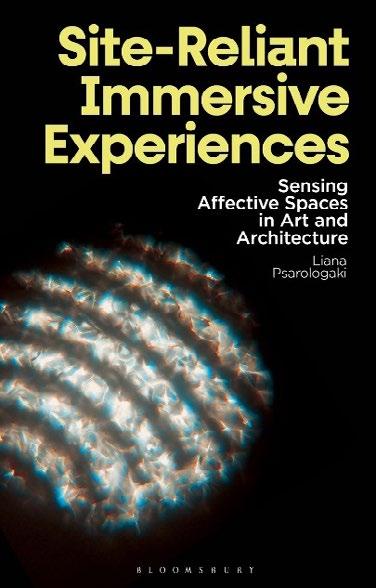
Conferences
Publications
Adefila, Arinola, Cheikhyoussef, Ahmad, Saarto, Annika, Egbadzor, Kenneth Fafa and Isomäki, Risto (2025) Baobab & Marula - New Solutions to Global Warming and Food Security. Into Books, Helsinki. ISBN 978-952-393-719-2
Ali, Naz and Constantinescu, Alexandra (2025) Food Policy, (In) Security and Poverty: A Rapid Evidence Assessment of Access to Nutritious Food for Migrants. In: Council for Hospitality Management Education Conference, 20-23 May 2025, University of Essex, Colchester.
Ali, Shabana (2025) Embedding successful change through collaboration. British Journal of Nursing, 34 (10). pp. 519-520. ISSN 2052-2819
Ali, Shabana (2025) Student experiences of using AI tools. In: RCN Education Forum National Conference and Exhibition 2025, 31 March -1 April
Alsararatee, Hasan H (2025) Diagnostic tools and methods for dermatological assessment. British Journal of Nursing, 34 (10). pp. 502512. ISSN 2052-2819
Alsararatee, Hasan H (2025) Novel insights into pulmonary embolism with negative D-dimer results. BMJ Case Reports CP, 18 (3). e264995. ISSN 1757-790X
Alsararatee, Hasan H (2025) Assessment, diagnosis and management of pulmonary embolism. International Journal for Advancing Practice. pp. 1-9.
Alsararatee, Hasan H, Mukhtar, Minahil and Musawar, Abdul (2025) Ethical principles and challenges in end-of-life care for frail older adults. British Journal of Nursing, 34 (11). pp. 547-553. ISSN 2052-2819
Amoateng, Geoffrey (2025) The role of locus of control in nursing practice: enhancing patient outcomes through empowerment and spiritual care. British Journal of Nursing, 34 (6). pp. 332-335. ISSN 2052-2819
Ansbro, Maria and Fitzgibbon, Wendy (2025) The Prevalence and Experience of Children on the Sex Offender Register in England and Wales. The British Journal of Social Work. ISSN 1468-263X
Ansbro, Maria and Fitzgibbon, Wendy (2025) The UK Sex Offender Register: Has the net been cast too wide? Criminology and Criminal Justice. ISSN 1748-8958 (In Press)
Avery, Carla, Stringer, Claire, Nash, Helena, Kippax, Anne, Melia, Claire and Webb, Lukah (2025) Safeguarding mothers and babies. British Journal of Midwifery, 33 (4). pp. 234-235. ISSN 20524307
Bartlett, Ross (2025) Investigating the Nature and Psychological Impact of Out-of-Body Experiences. Doctoral thesis, Buckinghamshire New University (Awarded by University of Staffordshire)
Bruce, Tor Alexander, Champney‐Smith, Eve, Eleftheropoulou, Satu, Nicholson, Tom, Lambert, Mark and Hill, Barry (2025) The WISE Room: An innovative multisensory space for self‐regulation and immersive support for neurodivergent students. British Journal of Special Education. ISSN 1467-8578
Burnell, Gillian, Wamburu, Amsale and Hill, Barry (2025) Enhancing the retention of newly qualified nurses. British Journal of Nursing, 34 (6). pp. 316-319. ISSN 2052-2819
Chalk, Fiona and Palmer, Annette (2025) The Impact of Ageing and Frailty on Wound Healing. British Journal of Nursing. ISSN 0966-0461
Clayton, Ben, Dunn, Gemma and Harris, John (2025) 21 years later: Reflecting on femininity, masculinity, physicality and the English tabloid press. International Review for the Sociology of Sport. ISSN 1012-6902
Cook, Neal, Trout, Ruth, Waterhouse, Catheryne, Braine, Mary, Barrett, Chris, Brennan, Paul, Teasdale, Graham, Hansen, Ole Abildgaard, Caponnetto, Valeria, Santana, Pedro Raúl Castellano, Küçükakgün, Hilalnur, Lynch, Claire, Shepherd, Andrea, Tulek, Zeliha and Wahl, Zoé (2025) The Glasgow Coma Scale: an international standard for education and practice with adults. British Journal of Neuroscience Nursing, 21 (Sup1c). S1-S36. ISSN 2052-2800
Cromwell, Jonas, Turkson, Charles, Dora, Manoj and Yamoah, Fred A. (2025) Digital technologies for traceability and transparency in the global fish supply chains: A systematic review and future directions. Marine Policy, 178. p. 106700. ISSN 0308597X
Dairo, Yetunde Marion and Gallagher, D. (2025) 266 Investigating the minimum effective dose and effect of rebound exercise in community-dwelling adults with neurological disorders: a pre-post interventional study. Physiotherapy, 126. p. 101718. ISSN 00319406
Depiver, Joshua, Mallik, Sabuj and Amalu, Emeka H. (2025) Finite Element Comparative Study on Creep and Random Vibrations of Solder Joints in BGA Package. Power Electronic Devices and Components. p. 100085. ISSN 27723704
Fields, Paul (2025) Beer and Joking in Las Vegas: Punk Humor and Punk Hypocrisy. In: NOFX Forty Years of "Problematic" Punk Provocations. Bloomsbury Publishing, pp. 47-64. ISBN 9798765128619
Fields, Paul (2025) I Heard They Suck at Interviews (But We Edited It for Clarity). Punk & Post-Punk. ISSN 2044-3706 (In Press)
Gormley, Gerard (2025) Concrete Dreams of Sound. In: Beast Feast 2025, 01 - 03 May 2025, Birmingham.
Hayward, Melanie (2025) The crisis of corridor care and its impact on nursing and patient safety. British Journal of Nursing, 34 (5). pp. 304-305. ISSN 0966-0461
Hill, Barry, Kelly, Daniel and Gill, Paul (2025) Cardiff University's cuts risk deepening the crisis in our healthcare organisations. British Journal of Nursing, 34 (5). pp. 298-299. ISSN 2052-2819
Hill, Barry, Wilkinson, Janet, Fox, Sadie Diamond and Burton-Gow, Helen (2025) Transition from advanced clinician to academic. British Journal of Nursing, 34 (8). pp. 404-405. ISSN 2052-2819
Hill, Barry and Williams, Mary (2025) A guide to the fundamental aspects of prostate cancer and the nurse's role. British Journal of Nursing, 34 (9). S10-S16.
Howes, Elizabeth and Williams, Mary (2025) Potential barriers to end-of-life care provision by paramedics in the community. Journal of Paramedic Practice, 17 (5). pp. 203-208. ISSN 2041-9457
Hua, Dongjie, Dong, Jie, Peng, Kaixiang and Zhang, Qichun (2025) A New Mechanism Model-Assisted Spatiotemporal Information Fusion Quality-Related Fault Diagnosis Method for LargeScale Industrial Processes. IEEE Transactions on Instrumentation and Measurement, 74. pp. 1-12. ISSN 1557-9662
Hubbard, Katharine (2025) Why aren’t we addressing inequity of outcomes for postgraduates? WONKHE.
Ibn-Mohammed, Taofeeq, Yamoah, Fred A. and Acquaye, Adolf (2025) Environmental impact accident. In: Elgar Encyclopedia of Energy Economics. Economics 2025 . Edward Elgar Publishing Ltd., pp. 215-217. ISBN 978 1 0353 10364
Kämpfe, Fredrik, de Oliveira, Renan and Lohmann, Gui (2025) Lessons learned from aviation decarbonisation efforts in Sweden and the world: managing and effectuating change. In: Research Handbook on Air Transport Leadership and Governance. Edward Elgar Publishing Ltd., United Kingdom, pp. 198-212
Makiyah, Estabraq H. and Khamiss, Nasser N. (2025) Optimizing augmented reality navigation over wireless networks using efficient point cloud streaming and compression. Multimedia Tools and Applications. ISSN 1573-7721
Martzoukou, Konstantina, Allan, Elaine and Hayward, Melanie (2025) Supporting digital resilience: Embedding “Maddie is Online” in SCPHN School Nurse education’. Journal of Family & Child Health, 2 (4). pp. 196-197. ISSN 3049-5229
Massullo, Brandon, Houran, James, Escola Gascon, Alex, O’Keeffe, Ciaran, Drinkwater, Kenneth and Dagnall, Neil (2025) Quality-Checking a Novel ‘Fact Sheet’ on Ghostly Episodes. Frontiers in Psychology. ISSN 1664-1078
Milic, Nela (2025) Residues of Postcollapse Art. In: Beyond Crises: Resilience and (In)stability. Memory Studies Association Conference, 14-18th of July, Prague, Czech Republic. (In Press)
Neill, Ruth, Manthorpe, Jill, McFadden, Paula, MacLochlainn, Justin, McGrory, Susan, Mallett, John, Nicholl, Patricia, Naylor, Rachel, Schroder, Heike, Currie, Denise and Ravalier, Jermaine (2025) Challenging times for early career social workers during the COVID-19 pandemic: A mixed methods study. The British Journal of Social Work. ISSN 1468-263X
O’Keeffe, Ciaran (2025) Magic Flights or Mind’s Eye? Competing Content Analyses of Dimensional-Slip Narratives. Journal of Transpersonal Psychology, 56 (2). (In Press)
O’Keeffe, Ciaran, Massullo, Brandon, Laythe, Brian, Dagnall, Neil, Drinkwater, Kenneth and Houran, James (2025) Haunted People Syndrome Redux: Concurrent Validity from an Independent Case Study. Journal of Scientific Exploration. ISSN 0892-3310
Okemuo, Adaora Justina (2025) Exploring Rebound Exercise for Adults with Neurological Disorders. Doctoral thesis, Buckinghamshire New University
Okubookubo, Nobuko, Prendergast, Nobuko Virginia, D Delemos, Christi, Evans, Vicki, Trout, Ruth and Braine, Mary E. (2025) Neuroscience Nursing Course Evaluation at the Graduate School of Nursing, St. Luke's International University: Results from 2016-2024. St. Luke's International University Bulletin. ISSN 2189-1591
Oragwu, Ukamaka, Aziz, Benjamin and Rezvy, Shahadate (2025) A machine learning approach for detecting cybersecurity vulnerabilities in the internet of medical things. Knowledge-Based Systems, 327. ISSN 1872-7409
Quaye, Enoch, Yamoah, Fred A., Patro, Pratyush K. and Acquaye, Adolf (2025) Decoupling economic growth from climate change: Unravelling the multi-dimensional dynamics of consumption-based emissions. Journal of the Operational Research Society. pp. 1-17. ISSN 0160-5682
Ravalier, J.M, Wegrzynek, Paulina, Dimolareva, Mirena, Bald, Caroline, Albertson, Dawn, Spicer-Manning, Georgia, McGale, Kate and Toscano, Thomas (2025) A Social Worker-Led Evaluation of the Professional Capabilities Framework (PCF). The British Journal of Social Work. ISSN 1468-263X
Singh, Gurpreet (2025) Sustainability Intelligence (SI): Transforming Denim Supply Chain Management - A Comprehensive Case Study of Turkey's Denim Industry. In: AUTEX 2025 World Conference, 11th to 13th June 2025. (In Press)
Stephens, A., Ibrahiim, Kalimah and McCrary, R. (2025) Epidemics, Health Disparities, and Racial. In: European Public Health Conference 2024: Sailing the Waves of European Public Health: Exploring a Sea of Innovation., 12-15 November 2024, Lisbon Congress Center, Lisbon, Portugal
Stuart, Charles, Stuart, Rachel, Dunn, Hannah, Wamburu, Amsale and Hill, Barry (2025) Understanding postural orthostatic tachycardia syndrome. British Journal of Nursing, 34 (5). pp. 288-292. ISSN 2052-2819
Tavener-Smith, Taryn, Das, Nandini and Salvo-Canlas, Debbie (2025) Triad Liminal Identities: Foreign origin, non-registrant GTAs teaching international pre-registrant students in the UK. Postgraduate Pedagogies, 5 (1). ISSN 2633-9870 (In Press)
Trout, Ruth and Chalk, Fiona (2025) Innovative teaching on continuing professional development courses using simple simulations. British Journal of Neuroscience Nursing. ISSN 2052-2800
Turkaslan, Esin (2025) Identifying Physician Associate Students' Preparedness Profiles in Primary Care. In: Physician Associate Educators Conference 2025, 22 - 23rd May 2025, Ulster University.
Woodbridge, Philip, Campbell-Karn, Kevin and McCormack, Fiona J. (2025) Nutritional intake, sports nutrition knowledge and energy availability in recreational female football players. Research in Sports Medicine. pp. 1-16. ISSN 1543-8627
Wyld, Lisa and Schmitz, Birte (2025) Embracing Sustainability. In: Addressing Contemporary Challenges in the B2B Hospitality Sector. IGI Global, pp. 1-34. ISBN 9798369397633
Yamoah, Fred A. and Nweke, Uchenna (2025) Thames Water’s record £123M penalty: A wake-up call to tackle the too-big-to-fail syndrome. New Civil Engineer.
Editor: James Shelton
COVER IMAGE
The cover image from this issue was submitted by Sonja Cimelli as part of the Research Conference’s Research on a Postcard competition, taken from their research into breaking at the Olympics. For more information please visit the Olympic Studies Centre
Photographs from the Research Conference provided by Georgia Deane and Hannah Deane, with thanks to Iwona Pienczak for providing further images.
This publication was produced by Buckinghamshire New University.
BF2902 Research Notes Winter Edition
